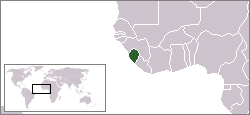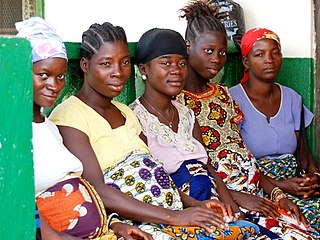Related Research Articles
Child marriage is a marriage or domestic partnership, formal or informal, between a child and an adult, or between a child and another child.

Human rights in Uganda have trended for the past decades towards increasing harassment of the opposition, cracking down on NGOs which work on election and term limits, corruption, land rights, environmental issues, womens, children and gay rights. In 2012, the Relief Web sponsored Humanitarian Profile – 2012 said Uganda made considerable developments Since at least 2013 the Freedom in the World report by Freedom House has identified Uganda as a country considered to be "Not Free".There are several areas of concern when it comes to human rights in Uganda, and the "Not Free" classification is due to both low political rights and civil liberties rankings.

Forced marriage is a marriage in which one or more of the parties is married without their consent or against their will. A marriage can also become a forced marriage even if both parties enter with full consent if one or both are later forced to stay in the marriage against their will.

The Special Court for Sierra Leone, or the "Special Court" (SCSL), also called the Sierra Leone Tribunal, was a judicial body set up by the government of Sierra Leone and the United Nations to "prosecute persons who bear the greatest responsibility for serious violations of international humanitarian law and Sierra Leonean law" committed in Sierra Leone after 30 November 1996 and during the Sierra Leone Civil War. The court's working language was English. The court listed offices in Freetown, The Hague, and New York City.

Ishmael Beah is a Sierra Leonean author and human rights activist who rose to fame with his acclaimed memoir, A Long Way Gone. His novel Radiance of Tomorrow was published in January 2014. His most recent novel Little Family was published in April 2020.

Haja Zainab Hawa Bangura is a Sierra Leonean politician and social activist who has been serving as the Director-General of the United Nations Office at Nairobi (UNON) since 2018, appointed by United Nations Secretary-General António Guterres. She served as the second United Nations Special Representative on Sexual Violence in Conflict with the rank of Under-Secretary-General of the United Nations from 2012 to 2017, in succession to the first holder of the post, Margot Wallström. In 2017 she was succeeded by Pramila Patten.
Prostitution in Sierra Leone is legal and commonplace. Soliciting and 3rd party involvement are prohibited by the Sexual Offences Act 2012. UNAIDS estimate there are 240,000 prostitutes in the country. They are known locally as 'serpents' because of the hissing noise they use to attract clients.

Lesbian, gay, bisexual, and transgender (LGBT) people in Sierra Leone face legal challenges not experienced by non-LGBT residents. Male same-sex sexual activity is illegal in Sierra Leone and carries a possible penalty of life imprisonment, although this law is seldom enforced.
The Small Boys Unit (SBU) was a group of children who were forcibly recruited by the Revolutionary United Front (RUF) as militants during the Sierra Leone Civil War. The war began in 1991, when the RUF desired to overthrow the government and gain control of the diamond mines, a major source of revenue for the country. In 1998, 25% of the soldiers fighting in the war were under 18, and of those, 50% were abducted and 28% were under the age of 12. The war ended with a ceasefire on 18 January 2002.

Child marriage in India, according to the Indian law, is a marriage where the woman and man both are younger than 21 years of age respectively. Most child marriages involve women, many of whom are poor socio-economic conditions.

Human rights in Sierra Leone are in a rather deplorable state, but have improved gradually since the end of its civil war in 2002. Among the major human-rights problems in Sierra Leone today, according to a 2011 U.S. State Department report, are "security force abuse and use of excessive force with detainees, including juveniles; harsh conditions in prisons and jails; official impunity; arbitrary arrest and detention; prolonged detention, excessive bail, and insufficient legal representation; interference with freedom of speech and press; forcible dispersion of demonstrators; widespread official corruption; societal discrimination and violence against women, discrimination based on sexual orientation; female genital mutilation (FGM); child abuse; trafficking in persons, including children; and forced child labor".

The extent of gender inequalities varies throughout Liberia in regard to status, region, rural/urban areas, and traditional cultures. In general, women in Liberia have less access to education, health care, property, and justice when compared to men. Liberia suffered two devastating civil wars from 1989–1996 and 1999–2003. The wars left Liberia nearly destroyed with minimal infrastructure and thousands dead. Liberia has a Human Development Report ranking of 174 out of 187 and a Gender Inequality Index rank of 154 out of 159.

Sierra Leone, officially the Republic of Sierra Leone, is a Constitutional Republic in West Africa. Since it was founded in 1792, the women in Sierra Leone have been a major influence in the political and economic development of the nation.
During the Sierra Leone Civil War gender specific violence was widespread. Rape, sexual slavery and forced marriages were commonplace during the conflict. It has been estimated by Physicians for Human Rights (PHR) that up to 257,000 women were victims of gender related violence during the war. The majority of assaults were carried out by the Revolutionary United Front (RUF). The Armed Forces Revolutionary Council (AFRC), The Civil Defence Forces (CDF), and the Sierra Leone Army (SLA) have also been implicated in sexual violence.
Roughly 10,000-14,000 child soldiers in Sierra Leone fought between 1991 and 2002 in the Sierra Leone Civil War. Children fought on both sides of the conflict. Nearly half of the Revolutionary United Front (RUF), and a quarter of the government armed forces consisted of children aged 8–14 years old.
The Sierra Leone's Truth and Reconciliation Commission was a truth commission created as part of the Lomé Peace Accord, which ended the 11-year civil war conflict in Sierra Leone in July 1999.

Child marriage is a marriage or union between a child under the age of 18 to another child or to an adult. Child marriage is common in a multitude of African countries. In South Sudan, child marriage is a growing epidemic. Child marriage in South Sudan is driven by socioeconomic factors such as poverty and gender inequality. Current figures state that South Sudan is one of the leading countries in the world when it comes to child marriage. Child marriage has negative consequences for children, including health problems and lower education rates for South Sudanese girls. Many initiatives have been taken to combat child marriage in South Sudan, but the presence of societal norms and instability continues to drive its presence in the nation.

The rehabilitation and reintegration of child soldiers is defined by Child Soldiers International as: "The process through which children formerly associated with armed forces/groups are supported to return to civilian life and play a valued role in their families and communities".
A child soldier is "...any person below 18 years of age who is or who has been recruited or used by an armed force or armed group in any capacity".

The status of women in Zambia has improved in recent years. Among other things, the maternal mortality rate has dropped and the National Assembly of Zambia has enacted multiple policies aimed at decreasing violence against women. However, progress is still needed. Most women have limited access to reproductive healthcare, and the total number of women infected with HIV in the country continues to rise. Moreover, violence against women in Zambia remains common. Child marriage rates in Zambia are some of the highest in the world, and women continue to experience high levels of physical and sexual violence.

Sierra Leonean nationality law is regulated by the Constitution of Sierra Leone, as amended; the Citizenship Act, and its revisions; and various international agreements to which the country is a signatory. These laws determine who is, or is eligible to be, a national of Sierra Leone. The legal means to acquire nationality, formal legal membership in a nation, differ from the domestic relationship of rights and obligations between a national and the nation, known as citizenship. Nationality describes the relationship of an individual to the state under international law, whereas citizenship is the domestic relationship of an individual within the nation. In Britain and thus the Commonwealth of Nations, though the terms are often used synonymously outside of law, they are governed by different statutes and regulated by different authorities. Sierra Leonean nationality is based on descent from a person who is Negro-African, regardless of whether they were born in Sierra Leone, jus soli, or abroad to a Sierra Leonean, jus sanguinis. The Negro clause was inserted based upon the founding of the colony as a refuge for former slaves to prevent economically powerful communities from obtaining political power. It can be granted to persons with an affiliation to the country, or to a permanent resident who has lived in the country for a given period of time through naturalisation.
References
- 1 2 "Early Marriage: A Harmful Traditional Practice". UNICEF. Archived from the original on 2020-05-18. Retrieved 2020-03-12.
- 1 2 "Before She's Ready: 15 places girls marry by 15" (PDF). Save the Children Resource Centre. World Vision International. 2008. Retrieved 2020-03-26.
- 1 2 3 "The Child Right Act, 2007: Supplement to the Sierra Leone Gazette Extraordinary Vol. CXXXVIII" (PDF). The Sierra Leone Web. September 3, 2007.
- 1 2 3 "The Registration of Customary Marriage and Divorce Act 2007 | Sierra Leone Legal Information Institute". sierralii.org. Archived from the original on 2021-01-18. Retrieved 2020-03-12.
- ↑ Lowenstein, Allard (2013). Before their time: Challenges to Implementing the Prohibition Against Child Marriage in Sierra Leone. Yale Law School. pp. 6–7. ISBN 978-0-9565219-9-6.
- ↑ "The State of the World's Children 2013: Children with Disabilities". UNICEF. Archived from the original on 2020-07-12. Retrieved 2020-03-13.
- ↑ "Child marriage". UNICEF DATA. Retrieved 2020-03-13.
- ↑ Lowenstein, Allard (2013). Before their time: Challenges to Implementing the Prohibition Against Child Marriage in Sierra Leone. Yale Law School. pp. 6–7. ISBN 978-0-9565219-9-6.
- ↑ Kamara, Mariatu (2008). The Bite of the Mango. Annick Press. pp. 81, 256–258, 260, 262, 264. OCLC 1057322049.
- 1 2 3 4 5 6 7 8 Burman, M. E.; McKay, S. (2007). "Marginalization of girl mothers during reintegration from armed groups in Sierra Leone". International Nursing Review. 54 (4): 316–323. doi:10.1111/j.1466-7657.2007.00546.x. ISSN 1466-7657. PMID 17958659.
- ↑ Brides, Girls Not. "Sierra Leone - Child Marriage Around The World. Girls Not Brides". Girls Not Brides. Retrieved 2020-03-13.
- ↑ ACPF (2014). The African Report on Violence Against Children. Addis Ababa: The African Child Policy Forum (ACPF).
- 1 2 3 Lowenstein, Allard (2013). Before their time: Challenges to Implementing the Prohibition Against Child Marriage in Sierra Leone. Yale Law School. pp. 6–7. ISBN 978-0-9565219-9-6.
- ↑ ACPF (2014). The African Report on Violence Against Children. Addis Ababa: The African Child Policy Forum (ACPF).
- ↑ United Nations General Assembly, Human Rights Council (September 25, 2013). "Human Rights Council Twenty-fourth session: Agenda item 3" (PDF). Girls Not Brides. Archived from the original (PDF) on December 18, 2020. Retrieved February 23, 2020.
- ↑ Government of Sierra Leone, Ministry of Finance and Economic Development (July 2016). "United Nations - Sustainable Development Goals: The 2030 Agenda for Sustainable Development - Advanced Draft Report on Adaption of the Goals in Sierra Leone" (PDF). UN Sustainable Development Goals Knowledge Platform. Retrieved February 23, 2020.
- 1 2 3 4 "UNFPA-UNICEF Global Programme to End Child Marriage". www.unicef.org. Retrieved 2020-03-13.
- 1 2 Lowenstein, Allard (2013). Before their time: Challenges to Implementing the Prohibition Against Child Marriage in Sierra Leone. Yale Law School. pp. 6–7. ISBN 978-0-9565219-9-6.
